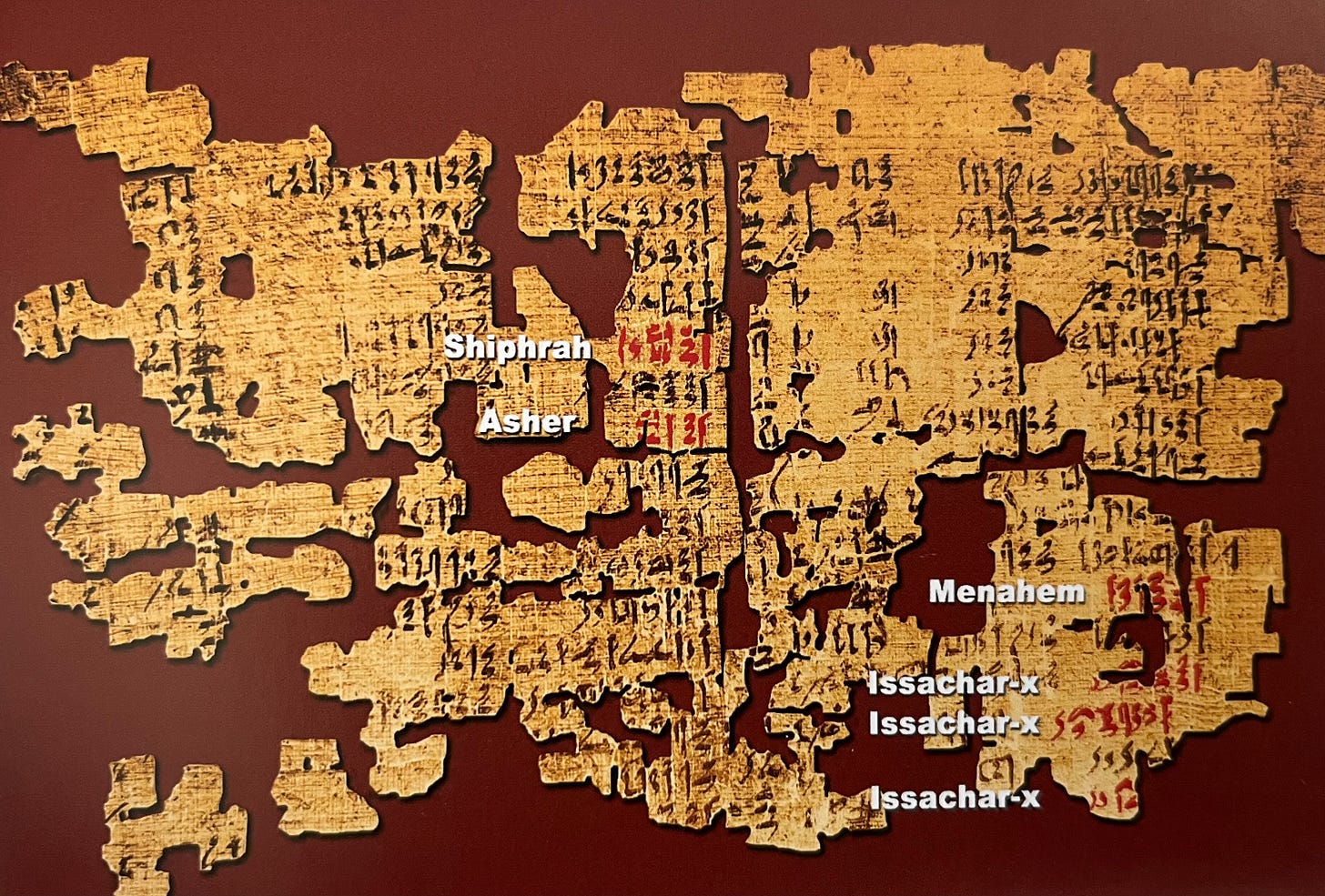Notes for Episode #69
Featuring information related to David Rohl's view of the Israelite soujourn into Egypt in the days of Joseph, and the later Exodus (which he dates around 1450 BC).


Did the Exodus Ever Happen?
Click here to listen to Episode 69 featuring Egyptologist David Rohl.
The Biblical Date of the Exodus from Egypt
1 Kgs 6:1 “In the four hundred and eightieth year after the people of Israel came out of the land of Egypt, in the fourth year of Solomon’s reign over Israel, in the month of Ziv, which is the second month, he began to build the house of the LORD.”
The dates for Solomon’s reign are generally well-established, which places the Israelite exodus from Egypt around 1447 BC. This is confirmed by another passage in Judges (11:26) which says the Israelites began their conquest of Canaan 300 years earlier. Since this passage relates to the period around 1100 BC, this would place the exodus and conquest (roughly speaking) around 1440 and 1400 BC, respectively. Thus, a consideration of both passages places the exodus sometime between 1450 and 1440 BC which conflicts with the widely held view that it took place centuries later during the reign of Ramasses II (1279-1213 BC).
Does the Bible Mention Ramasses?
Ex 1:11 “They built for Pharaoh store cities, Pithom and Raamses.”
The reference to the store-city of “Raamses” has led many scholars to conclude that the events of Exodus must have occurred in the 19th dynasty during the reign of Ramasses II. However, according to Genesis 47:11, Joseph had also settled his family in the land of “Rameses” centuries earlier. According to James Hoffmeier, “The appearance of Ramesses in the Joseph story need only be ascribed to the time of the authority (or subsequent editorial activity) and not the historic setting of Joseph.”1 Hoffmeier is correct, but his comments should be applied both to Gen 47:11 and Ex. 1:11.
Josephus’ citation of the Egyptian Historian Manetho
Apion 1:73-82 I shall begin with the writings of the Egyptians…Manetho was a man who was by birth an Egyptian; yet had he made himself master of the Greek learning, as is very evident, for he wrote the history of his own country in the Greek tongue, by translating it, as he saith himself, out of their sacred records…Now, this Manetho, in the second book of his Egyptian History, writes concerning [the Jews]] in the following manner. I will set down his very words, as if I were to bring the very man himself into a court for a witness:
There was a king of ours, whose name was Timaus (τοῦτίμαιος). Under him it came to pass, I know not how, that God was averse to us; and there came, after a surprising manner, men of ignoble birth out of the eastern parts, and had boldness enough to make an expedition into our country, and with ease subdued it by force, yet without our hazarding a battle with them. So when they had gotten those that governed us under their power, they afterwards burnt down our cities, and demolished the temples of the gods, and used all the inhabitants after a most barbarous manner; nay, some they slew, and led their children and their wives into slavery...He chiefly aimed to secure the eastern parts as foreseeing that the Assyrians…would be desirous of that kingdom and invade them; and…found a city very proper for his purpose…called Avaris…This whole nation was styled Hycsos—that is, shepherd-kings: for the first syllable, Hyc, according to the sacred dialect, denotes a king, as is Sos a shepherd, but this according to the ordinary dialect; and of these is compounded Hycsos. But some say that these people were Arabians.
Clement of Alexandria’s citation of Eupolemus and Artapanus
Stromata 1.23 Eupolemus2 in his book On the Kings in Judea, says that “Moses was the first wise man, and the first that imparted grammar to the Jews, that the Phoenicians received it from the Jews, and the Greeks from the Phoenicians.” …And so Artapanus,3 in his work On the Jews, relates that,
Moses, being shut up in custody by Chenephres, king of the Egyptians, on account of the people demanding to be let go from Egypt, the prison being opened by night, by the interposition of God, went forth, and reaching the palace, stood before the king as he slept, and aroused him; and that the latter, struck with what had taken place, bade Moses tell him the name of the God who had sent him; and that he, bending forward, told him in his ear; and that the king on hearing it fell speechless, but being supported by Moses, revived again.
The Brooklyn Papyrus
This ancient papyrus records the names of numerous household slaves during the reign of Pharaoh Sobekhotep III (c. 1740 BC). As you can see below, many of the individuals listed in this document have names that are commonly associated with the people of Israel (cf. Gen 30:13, 18, Ex 1:15, 2Kgs 15:14).

Archaeology Magazine on the discoveries at Tell el-Dab’a
According to the author of this article, drought and famine brought Canaanites into the land of Egypt. “This was the beginning of a period of intensive immigration, one the pharaohs tried to control with planned settlements and fortresses. [According to archaeologist Manfred] Bietak…‘They moved into Egypt and offered their services to the local ruler in exchange for something to eat.’” This seems to match the narrative we find in Genesis 41. Click here to read the full article.
Douglas Petrovitch on Hebrew as the World’s Oldest Alphabet
I discussed the views of Petrovitch with Dr. Rohl toward the latter part of the interview. If you’d like to read further on this topic, use the following links:
The World’s Oldest Alphabet, to order the Petrovitch lectures click here.
A Conversation with Douglas Petrovitch
David Rohl: Video Clips, Lectures & Documentaries
Click here to watch a teaser for the Patterns of Evidence documentary that highlights the work of David Rohl (to rent or watch the entire documentary, click here). Here are additional links to Dr. Rohl’s lectures, along with short segments from the documentary:
David Rohl Lectures, to purchase the complete set click here
Joseph’s Arrival in Egypt, David Rohl and James Hoffmeier
Joseph’s Palace & Pyramid Tomb, David Rohl
Evidence of Israelite Slavery in Egypt, David Rohl and James Hoffmeier
James Hoffmeier, Israel in Egypt (1996), page 132, footnote 141
Eupolemus is possibly the same individual referred to in 1 Mac 8:17ff. Though his book On The Kings of Judea is no longer extant, it was probably written around 160 BC.
Artapanus of Alexandria’s work is also no longer extant. The book cited by Clement was likely written sometime between 250 and 100 BC. According to Rohl, the mention of an Egyptian king called “Chenephres” is likely a reference to Khaneferre Sobekhotep IV.



How long was Israel in Egypt , after the famine pilgrimage, until Moses led the Exodus?